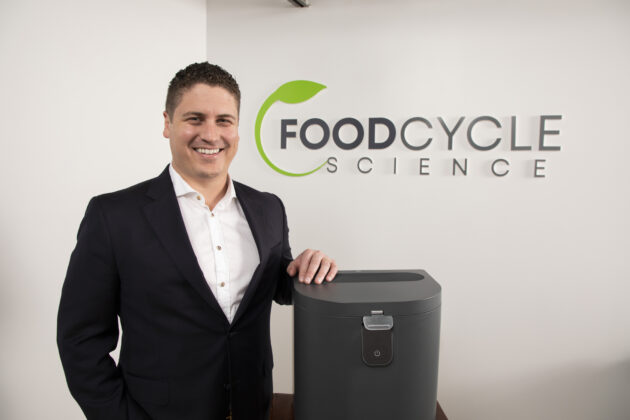
CFIN awards $2.5M to reduce plastics in the food sector
By Food in Canada Staff
Packaging Sustainability Canadian Food Innovation Network Copol International Editor pick Food Cycle Science Plastic Brand Crepeau CEO, FCS.
Brand Crepeau CEO, FCS. The Canadian Food Innovation Network (CFIN) is investing $2,509,779 into two projects focusing on the reduction and replacements of single-use plastics in the food sector. The projects are valued at over $5M and are funded through the organization’s Food Innovation Challenge Program.
The Food Innovation Challenge funding recipients are Food Cycle Science and Copol International.
Food Cycle Science (FCS), Ottawa, Ont., and its partners, Weaving Baskets Group and Bridgehead Coffee, are interested in applying enzymes to the FoodCycler (FC) system to rapidly degrade biodegradable plastics and transform them, along with food waste, into a beneficial soil amendment that reduces reliance on artificial fertilizers and contributes to a circular food economy. They’re receiving $1,650,82o from CFIN.
Biodegradable plastics are proposed as a solution to reducing single-use plastics in landfills. However, solutions must be both sustainable and affordable to accelerate adoption and consumer trust in biodegradable plastics. This “one-bin” system will be capable of processing the food waste and bioplastics together, accelerating the adoption of bioplastics and contributing to eliminating single-use and non-durable goods from the food service industry.
This solution will be widely accessible and equitable and directly address the rural, remote, and Indigenous communities’ infrastructure gap.
“We believe that sustainability should not come at a high cost or be inconvenient for individuals or businesses. This project is an example of our commitment to designing solutions that are accessible, affordable, and easy to use. By making it easier for people to make sustainable choices, we can accelerate the adoption of biodegradable plastics, reduce food waste, and contribute to a more circular economy,” said Brand Crepeau CEO, FCS.
Copol International (Sydney, N.S.) partners with the Verschuren Centre, Farnell Packaging, and GN Thermoforming Equipment to create multifunctional biopolymer food packaging applications to improve the sustainability of food packaging and shelf-life extension. This project earns $858,959.55 in funding.
This collaborative project will produce optimized biopolymers that are compostable in municipal compost facilities and validate their use in the food sector. Biopolymers can achieve and exceed the desired performance of existing non-renewable plastics and can be directly integrated and scaled within the existing infrastructure of plastics manufacturers. Building on successful testing at bench-scale extrusions, several biopolymers’ formulations will be scaled and expanded to further improve their functionality. Optimized prototypes will be utilized in large pilot-scale extrusion trials to produce commercial runs of food film bioplastics for test deployment with the industry partners.
The proposed multifunctional platform of bioplastics demonstrates an attractive alternative to food packaging, replacing conventional single-use plastic packaging and articles that fall under the federal Single-Use Plastics Prohibition Regulations.
“At Copol International, we are dedicated to advancing our products, developing innovative solutions to improve sustainability of plastics, and reducing plastic waste. With CFIN’s support we will build on the existing bench scale development at the Verschuren Centre on biopolymers, paving the way for a fully compostable biopolymer films to be manufactured locally and tested in the industry. This will enable Copol to compete on the world stage and help make Canada a leader in adopting sustainable biopolymer-based alternatives to plastics packaging,” said Denis Lanoe, VP of operations and general manager, Copol International.
This funding call from CFIN targeted proposals for innovative and sustainable solutions to reduce, replace, and recycle plastics within Canada’s food sector. Canada, like most modern economies, has a plastics problem. Approximately 87 per cent of plastics waste in our country currently ends up in landfills or in the environment, with packaging generating 47 per cent of total plastic waste. Additionally, single-use plastics are poorly recovered or diverted from waste streams, further emphasizing the need for alternative solutions that can enhance the recyclability or industrial composting of food products. CFIN received 11 applications for this Food Innovation Challenge.
“Each year, Canadians throw away approximately 4.4 million tonnes of plastic waste and the food industry – which has a heavy reliance on plastics – is a key contributor to this problem. These two projects are great examples of how Canadian innovation is tackling our growing plastics problem and creating new and sustainable ways to move the food sector forward,” said Dana McCauley CEO, Canadian Food Innovation Network.
Print this page